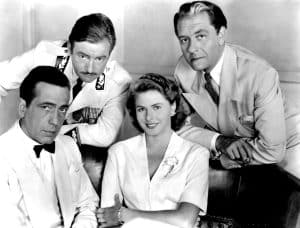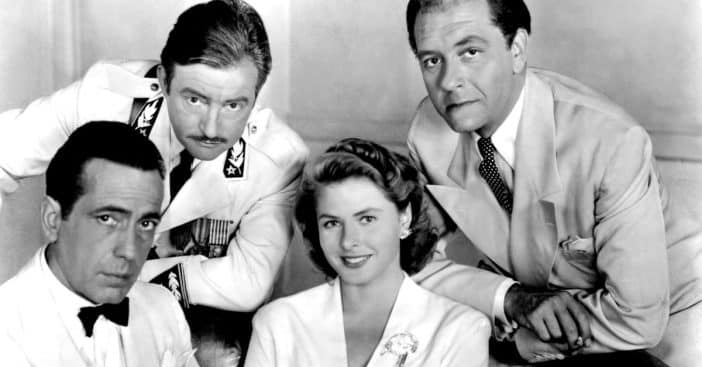
Here’s looking at you, Casablanca. Today, it is a testament to filmmaking at its most triumphant, one of the very first selected for preservation in the National Film Registry for being “culturally, historically, or aesthetically significant. But there were times early on when Casablanca never came to be, and those rough times happened right at the start of production.
Released in 1942, Casablanca had plenty of ingredients for success, like illustrious leads Humphrey Bogart and Ingrid Bergman. For further reference, the American Film Institute listed Bogart as the greatest male star of classic American cinema, and Bergman was listed as the fourth-greatest female screen star of Hollywood. The only problem was none of the people involved could see the light at the end of the tunnel when they dove into this project, with near-disastrous consequences.
‘Casablanca’ faced its first disaster with its biggest assets
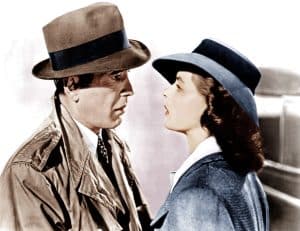
Part of the heart of Casablanca resided with its leading duo of Bogart and Bergman. But for how epic their tale seems now, neither party quite knew what to do with their respective character. Bogart felt like he was in completely foreign territory not just physically but career-wise too; he was used to being a tough guy archetype thanks to Petrified Forest, High Sierra, and The Maltese Falcon. But a quieter romantic?
RELATED: Ingrid Bergman’s Grandson Reveals What Life Was Like With The Star, How She Endured Scandal
“Bogart was not that into the character,” explained film critic and Turner Classic Movies host Ben Mankiewicz. Because Bogart didn’t know how to channel his inner romantic, “Bogart and Bergman had no chemistry at first.” Mankiewicz continued. In fact, the two outright didn’t get along when the films weren’t rolling, and they gave each other the silent treatment to further cultivate a frigid relationship. “How do we get the greatest love story Hollywood ever told while all this is happening? When you realize this is going on, everything about the movie becomes gripping.”
Bogart wasn’t the only one having trouble understanding the fundamentals of his character; Bergman was in much the same boat, fretting, even when filming began – with half the script still not finalized – whether Ilsa loved Laszlo or Rick. But the conflicts didn’t end there.
Before becoming a piece of movie history, ‘Casablanca’ had a very rough start in all departments
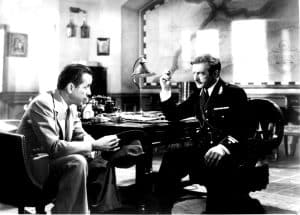
Bergman also butted heads with some of the team from the moment she set foot in Burbank. Bergman was very set on allowing her natural beauty to be allowed to shine, even with subtle details others might call imperfections. This policy did not go over well with producer David Selznick’s wife, Irene, who saw Bergman and asked, “You mean you have nothing on your face?”
Bergman didn’t, and Irene followed up with, “Your eyebrows are too thick, and your teeth are no good, and there are lots of other things . . . I’ll take you to the makeup department in the morning.”
Bergman took it up with the man who had requested she come all the way to America from Sweden, retorting, “I think you’ve made a big mistake. You shouldn’t have bought the pig in the sack. I thought you saw me in the movie Intermezzo and liked me, and sent [agent] Kay Brown across Sweden to get me. Now you’ve seen me, you want to change everything. So I’d rather not do the movie . . . I’ll take the next train and go back home.” The two stared each other down until Selznick relented, though not before spinning Bergman’s refusal to do work on her appearance as his own idea, to present her to America as “the first natural” actress.
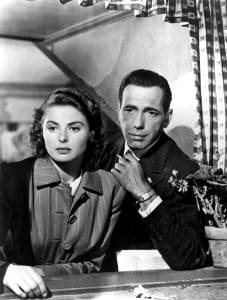
Bergman’s determination to stand her ground ended up a huge strength for her and the film, but in the background, Casablanca was still having a rough time of it. It started as an unfinished play called Everybody Comes to Rick’s, but having this starting point didn’t stop it from going through several writers over the course of production. All the while, those writers had to navigate the tight net of censorship. For instance, Ilsa’s fate was sealed to never choose Rick because that would condone adultery; Laszlo’s presumed death was the only thing that allowed the two their carefully-worded trist.
In a twist, Mankiewicz notes, timing played a grimly helpful role too; studio reader Stephen Karnot did not review the fledgling film until December 8, 1941, just after America was attacked at Pearl Harbor. Since Casablanca ended up something of a propaganda film in the context of World War II, which America soon found itself fully entering, on top of Hollywood censors, production also had to contend with the military making sure the right motivational and moral messages came across. So, although the main three were in their own little corner untouched by the Luftwaffe, they still, at the end of the day, answered the call.
Against all odds, that’s also exactly what the cast and crew of Casablanca managed to do when the time came.
